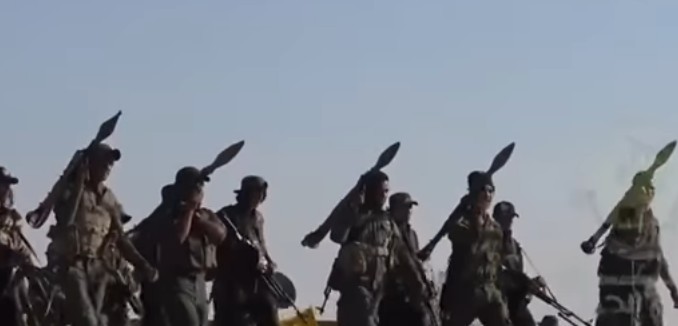A Hezbollah commander said that the Iranian proxy group plans to bring its war against Israel to “the Galilee someday soon,” Buzzfeed News reported Sunday.
The outlet reported on Iran’s multinational network of tens of thousands of highly trained and experienced combatants from across the Middle East, which Tehran uses to fulfill its imperial ambitions in Syria, Iraq, Lebanon, and Yemen.
The report was compiled through extensive research over six months comprising of interviews with analysts, officials, and militia fighters, and documented the secret Iranian military program that is threatening the entire region with further bloodshed and instability.
Under the radar of the international community, which is still transfixed on the 2015 nuclear agreement and wholly unprepared to confront Iran’s aggressive behavior, Tehran is seeking to establish a Shia Crescent reaching from the Gulf of Aden to the shores of the Mediterranean.
Ever since the U.S.-led invasion of Iraq in 2003, the Iranians have had their eyes on their Shiite-majority neighbor, with the intent to infiltrate the country’s government, commerce, and military infrastructure. Estimates suggest that no less than 65,000 Iraqi militia fighters have received training, weapons, or funding from Iran, groups that also have been party to a litany of human rights abuses and war crimes.
But Iranian dominance in Iraq is just one stepping stone for the regime in Tehran towards regional hegemony. Already in 2013, The Wall Street Journal reported on the Iranian effort to marshal Shiites from across the Middle East to protect embattled Syrian President Bashar al-Assad. Approximately 5,000 to 7,000 Hezbollah fighters are stationed in Syria at any given time and the Fatemiyoun Brigade, a unit of Iran’s Islamic Revolutionary Guard Corps, comprised of Afghan fighters, numbers up to 17,000 combatants.
Some of the militia fighters receive highly specialized training from Iran, including firing medium-range rockets and testing military vehicles, as well as training on Iranian Bourkan or Volcano and Zelzeleh rockets, which Hezbollah fighters have launched in the past against Israel. There have also been reports of Hezbollah fighters flying aircrafts in Syria.
In addition, U.S. and other officials have warned of Iran’s increased meddling in the Yemeni civil war on behalf of the Shiite Houthi rebels, responsible for recent attacks on ships off the coast of Yemen that could cripple crucial sea lanes. Israeli officials are particularly concerned about what appears to be an emerging bridge between Iran’s Zagros Mountains all the way to the borders of Israel, controlled by militia groups loyal to Tehran.
“We train them [militia groups] in all kinds of street weapons,” Hoder, a Hezbollah commander, told BuzzFeed. “What we learn, we used on the ground in [southern Lebanon] against the Israelis in 2006, and in Aleppo in 2015.”
“And hopefully, in the Galilee someday soon,” Hoder added, referring to the northern part of Israel, making no secret of Tehran’s goal to use Syria in its fight against Israel.
Hoder’s assessment of the situation echoes a recent statement by Hezbollah leader Hassan Nasrallah, who threatened that the next war with Israel could see thousands of Shiite militia fighters join forces with Hezbollah to fight Israel. “This could open the way for thousands, even hundreds of thousands of fighters from all over the Arab and Islamic world to participate – from Iraq, Yemen, Iran, Afghanistan and Pakistan,” Nasrallah said in a televised speech in June.
All across the Middle East, Iran’s proxies feel emboldened by Iranian dominance. During his joint press conference with Lebanon’s Prime Minister Saad Hariri last week, President Donald Trump praised Lebanon for its resilience “on the front lines in the fight against ISIS, Al Qaeda, and Hizballah.”
But experts have warned that Trump’s encouragement of the Lebanese Armed Forces as a counter-force to Hezbollah is misplaced because Hezbollah controls Lebanon. “We are winning,” said Hoder, the Hezbollah commander. “Look who’s running Lebanon. Look who’s controlling Sanaa and Baghdad.”
The nuclear agreement has and continues to shield Iran from the consequences of its actions, but with the Trump administration taking a much tougher line on Iran than the previous administration, U.S. officials have grown increasingly vocal about Iranian activities and are working on strategies to counter them.
“We watch Iran’s impact across the region from the militia they maintain,” said U.S. Secretary of Defense James Mattis during a visit to Saudi Arabia in April. “Iran’s got its own military inside Syria, continuing to hold Assad in power. Everywhere you look, if there is trouble in the region, you find Iran,” he concluded.
[Photo: FSA Platform / YouTube ]




